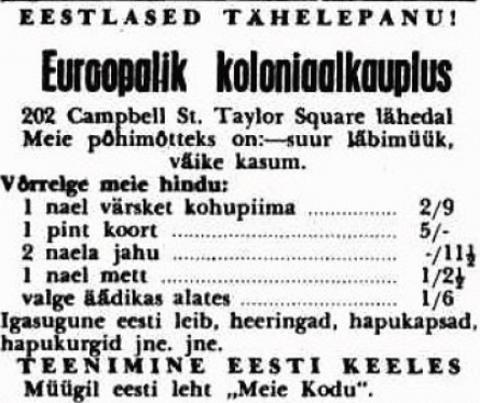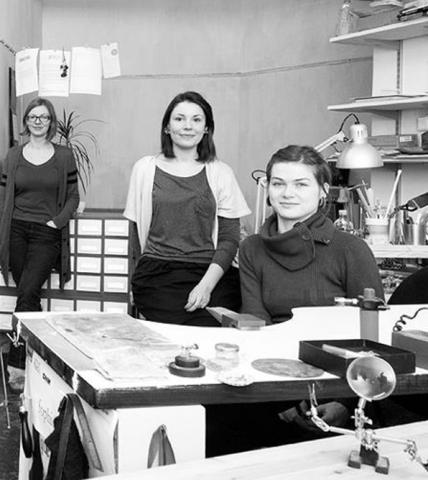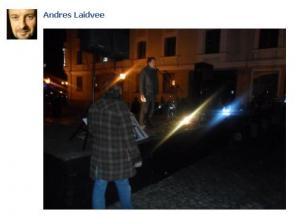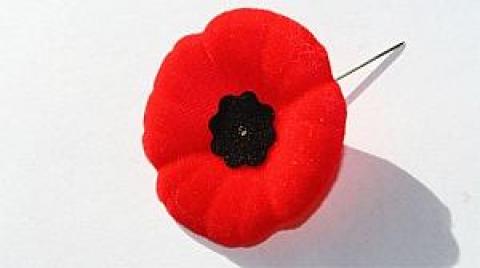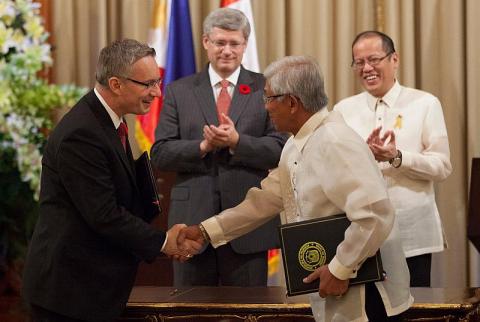________________________________________________________
IV WORLD CONGRESS OF FINNO-UGRIC PEOPLES
Tallinn, Estonia 15-19 August 2004
Congress Office
http://www.suri.ee/kongress
tel. (+372)644 2222
phone/fax (+372)644 9270
e-mail
Andres Heinapuu
General Secretary
phone (+372)56 954 740
e-mail
Valeri Kalabugin
Press Secretary
phone (+372)526 8454
e-mail
________________________________________________________
P R E S S R E L E A S E Voru, Estonia, 25 April 2004
For immediate release
CONSULTATIVE COMMITTEE OF FINNO-UGRIC PEOPLES HOLDS ITS SITTING IN ESTONIA
DECISIONS TO HOLD THE FOURTH WORLD CONGRESS OF FINNO-UGRIC PEOPLES
At its sitting concluded today (April 25) in Voru, Estonia, the Consultative Committee of Finno-Ugric Peoples took its last decisions concerning preparations to the World Congress of Finno-Ugric Peoples to be held this August in Estonia's capital Tallinn. Participating in the sitting were
representatives of Erzya and Moksha peoples (referred to also as the Mordovians), Estonians, Finns, Hungarians, Ingrian Finns, Khanties(Ostyaks),Komi, Livonians, Mansi(Vogul), Maris, Nenetses, Saamis(Lapps), Setu, Tver
Karelian, Udmurts, and Vepsians.
On the day of their arrival to Voru (22 April), the Voru county elder Mait Klaassen received the visitors and gave a dinner.
On the first day of the sitting of the Advisory Committee (23 April),Estonian Minister of Culture and Education Toivo Maimets came to Voru to meet with members of the Consultative Committee. He said that the Estonia's
Kindred Peoples Programme started in 1998 will be concluded this year, while a new programme up to 2009 is being developed taking into account the results of previous activities. Based on its experience, Estonia will continue supporting Finno-Ugric co-operation and assisting development of Finno-Ugric cultures. Estonia will yearly allot 5 million Estonian Kroons for this programme. Minister acquainted the Advisory Committee's members
with documents and agreements on which the Estonia's policy toward kindred peoples is based. Touching on new opportunities and problems arising in connection with Estonia's accession to European Union, Minister stressed
that the more viable kindred languages are, the stronger are the positions of Estonian language. He said that Estonia has also a moral duty to support its kindred peoples the way they supported Estonia in hard times. Quoting Estonia's Prime Minister Juhan Parts, Minister said: "As the state of Finno-Ugric minorities in some countries causes concern, democratic forces must apply more effort to protect them". Minister's speech was followed a
live conversation with Finno-Ugric representatives.
The Consultative Committee considered applications for membership from the Kvens from northern Norway and the Setos from Southern Estonia, and unanimously accepted them as full members. Both peoples have similar problems arising from various opinions on whether their languages ought to
be considered independent and the peoples themselves viewed as separate nationalities. In international law, the principle of self-determination suggests that the opinion of peoples themselves must be considered above all. The Setos and the Kvens will now be represented by their own separate delegations at the World Congress of Finno-Ugric Peoples.
The Consultative Committee discussed the programme of the 4th World Congress to be convened in Estonian capital Tallinn this August. The Congress will hold five workshops on the subjects of special importance for Finno-Ugric
peoples. Subjects for workshops were approved and chairpersons appointed.
The Section on Ethnic Policy will be chaired by Finnish representative Heikki Talvitie, the Languages and Education Section by Estonian representative Mart Rannut, the Mass Media and IT Section by Udmurt representative Nikolai Strelkov, the Section of Culture by Finnish representative Ildiko Lehtinen, and the Public Health, Demography and the
Ecology Section by Lyudmila Gromova representing Tver Karelians. Aleksei Konyukhov representing the Komis was appointed chairman of the drafting committee.
The cultural programme of the World Congress was discussed. On August 15, the opening day of the Congress, presentation of the best Finno-Ugric and other indigenous peoples' projects in the area of ethnic culture will be arranged. During the congress, a variety of cultural events will be held in Tallinn.
A representative of Khanties, Chairman of the Council of Khanty-Mansi Autonomous District (Russia) Vasily Sondykov made the proposal to hold the next 5th World Congress of Finno-Ugric Peoples in 2008 in the district's capital Khanty-Mansiysk. The Consultative Committee agreed and asked to present the proposal at the Congress for approval.
The Advisory Committee will hold its next sitting a day before the Congress starts its work.
Members of the Consultative Committee visited the Voro Institute, an organisation of Voro language and culture studies. Its director Kaido Kama,formerly minister at the Estonian government, spoke about the Institute's activities to encourage the revival of this southern Estonian language and the local culture. The Voro-Estonian dictionary published in 2002 was presented to the guests by its author Sulev Iva. Visitors and hosts agreed that problems of Finno-Ugrians of Russia and the Voros are similar and that, in some cases, the Voros have been more successful. An agreement was reached that the Institute with continue its co-operation with the Karelians and with the Republic of Mordovia.
The delegation of Maris met with followers of the traditional Estonian Faith of Earth. The Maris expressed their intention to arrive in August for the Congress a day earlier. Together they with visit Estonia's local sacred
places and ask at the Gods to bless the Congress.
___________________________________
BACKGROUND INFORMATION
The Finno-Ugrians are the oldest language family in Europe. Mostly indigenous inhabitants of their territories, altogether 24,2 million strong, many of them are now minorities in their lands. Out of the total of 24
Finno-Ugric peoples, there are only three who have their own nation-states today. These are Hungarians, Finns and Estonians. Some Finno-Ugric peoples have their ecology, language and culture endangered. Some are on the verge
of dissolving among newcomers. And some are on the verge of physically dying away.
The World Congress of Finno-Ugric Peoples is convened every fourth year. The first congress took place in 1992 in Syktyvkar, the capital city of Komi Republic, Russian Federation; the second congress was held in 1996 in
Budapest, Hungary; and the third, in 2000 in Helsinki, Finland. Preparations for the 4th World Congress of Finno-Ugric Peoples are supervised by an Estonian non-profit organisation 'Fenno-Ugria'. This patron of this year's
congress is President of the Republic of Estonia Arnold Ru"u"tel.
The Consultative Committee is the body of the World Congress of Finno-Ugric Peoples assigned with the task of coordinating the cooperation of peoples in the periods between congresses and preparing convocation of congresses.
The place for World Congress of Finno-Ugric Peoples is chosen by rotation. After the Hungarians, Finns and Estonians have had the honour of holding this great event, next congresses will now be rotated along remote places in
Russia where most Finno-Ugric peoples live. Taking the number of peoples and that the congress is convened every fourth year, that Erzyas and Mokshas will hold jointly one congress, that Udmurts and Bessermen will do the same,
and that Kvens, Livonians and the Saamis live outside Russia, the conclusion is that 16 congresses will be held in Russia. Which means that the 2000 congress may be the last one held outside Russia for the next 64 years.
*****
FINNO-UGRIC PEOPLES: POPULATION
The total number of Finno-Ugrians in the world is 24 millions.
In the 20th century, the Kamasin language ceased to be spoken. The remaining Enets and Votian languages speakers are only elderly people. The number of Livonian language speakers decreased during the last century from two
thousand to some twenty people.
-----------------
TABLE
-----------------
People
Population
Increase / decrease, 1989 to 2002 *
Comments
_______________________________________________
Hungarians
15 000 000
(n/a)
Estimated total population in Hungary, Romania, Slovakia, Serbia, Ukraine,
Croatia, Serbia, Austria, etc.
Finns
5 000 000
(n/a)
Estimated total population in Finland, Sweden, Russia, etc.
Estonians
1 000 000
(n/a)
Estimated total population in Estonia, Russia, Finland, Sweden, etc.
Mordvinians (Erzyas and Mokshas)
845 000
78%
Figures from the Russia 2002 population census. Living mainly in mid-Russia.
Udmurts *
637 000
89%
Figures from the Russia 2002 population census. Living in the republics of
Udmurtia, Tatarstan, Bashkortostan, Mari El and in the Kirov, Perm ja
Sverdlovsk oblasts (Russia).
Maris *
605 000
94%
Figures from the Russia 2002 population census. Living in the Republic of
Mari El and adjacent territories, in the republics of Bashkortostan,
Tatarstan and in the Yekaterinburg and Perm oblasts (Russia).
Zyryan Komis *
293 000
87%
Figures from the Russia 2002 population census. Living in the Komi Republic
(Russia).
Permian Komis *
125 000
85%
Figures from the Russia 2002 population census. Living in the Perm oblast
(Russia).
Saamis
100 000
(n/a)
Estimated total population in Norway, Sweden, Finland and Russia.
Karelians *
93 000
74%
Figures from the Russia 2002 population census. Living in the Republic of
Karelia and in the Leningrad and Tver oblasts (Russia).
Nenetses
41 000
83%
Living in the Nenets, Yamal-Nenets, Taymyr and Khanty-Mansi autonomous
districts (in the European part of Russia and in Western Siberia).
Khantys
29 000
132%
Figures from the Russia 2002 population census.
Living in the Khanty-Mansi and Yamal-Nenets autonomous regions and in the
Tomsk oblast (Western Siberia).
Mansis
12 000
150%
Figures from the Russia 2002 population census. Living in the Khanty-Mansi
autonomous district and in the Sverdlovsk oblast (Western Siberia).
Vepsians
8 000
67%
Figures from the Russia 2002 population census.
Living in the Republic of Karelia and in the Leningrad and Vologda oblasts
(Russia).
Kvens
6 000
(n/a)
Estimated figure.
Living along the shore of the Arctic Ocean in northern Norway.
Selkups
4 000
111%
Figures from the Russia 2002 population census.
Living in Western Siberia between the rivers Ob and Yenisey.
Setos
3 200
(n/a)
Estimated figure. Living in Estonia and in the Pskov oblast (Russia).
Besermans
3 000
(not counted
in 1989)
Figures from the Russia 2002 population census. Living in the Udmurt
Republic.
Nganasans
900
69%
Figures from the Russia 2002 population census. Living in the Taymyr
peninsula in Siberia.
Ingrians (Izhorians)
700
88%
Figures from the Russia 2002 population census.
Living in the Leningrad oblast.
Enetses
300
150%
Figures from the Russia 2002 population census.
Living in Northern Siberia in the Taimyr autonomous district along the lower
reaches of the Ob River
Livonians
250
(n/a)
Estimated total population in Latvia.
Votians
100
(not counted in 1989)
Figures from the Russia 2002 population census.
Living in the Leningrad oblast.
* The figures of the Russia 2002 population census were compared with those
of the USSR 1989 census for the Russian SFSR. It is not possible to trace
the dynamics of other peoples in a uniform way because of the absence,
inadequacy or dissimilarity of the available data.
___________________________________
IV WORLD CONGRESS OF FINNO-UGRIC PEOPLES
Kuumad uudised | 25 Apr 2004 | EWR
Kuumad uudised
TRENDING






